Readers of Rye News may have read reports on the three previous trips that I have made to provide emergency dental relief to the many refugees (mainly Syrians) who found themselves stranded in northern Greece, when the borders were closed at short notice early last year. Most of the refugees are still there, some have been resettled to various European countries, though not the UK, as the British government will only take refugees from camps in Turkey or Jordan.
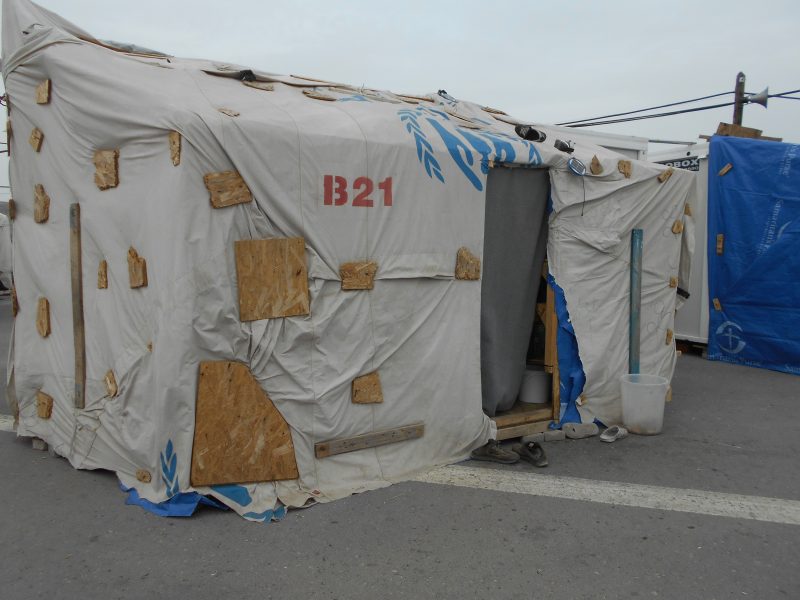
My fourth trip was in April and May, and, as on two previous visits Diana, my wife, accompanied me to assist. I have observed how the situation has evolved since my first visit in July 2016. Then all the refugees were in camps with military guards and housed in tents, as dentists we were working in tents or shipping containers. By February 2017 the situation had changed. Only a few people were housed in tents and now none are. Many of the camps have been dispersed, with under occupied hotels or private flats being rented to provide accommodation, the very poor economic situation in Greece making this easier. In the camps that continue to exist, the housing is in portable cabins. It was interesting to see how some of these have been customised with makeshift extensions. The portable cabins do not have running water; toilet and shower blocks are provided separately.
At Nea Kavala, a camp at a disused military airfield, I encountered patients from Burundi, Uganda and, most surprisingly, Kuwait as well as from Syria and Iraq. As Kuwait is one of the richest countries in the world, I did not expect to be meeting anyone from there in a refugee camp. The translator explained that a sizeable proportion of the population of Kuwait (about 10%) are not recognised as citizens by their government. This means they have no right to passports, marriage or birth certificates or an education and are held in something like contempt by many of their more fortunate fellow Kuwaitis. They are called the Bidoon (not to be confused with Bedouin) and they are a largely unknown group. Some of those who are able to escape their miserable lives in Kuwait, buy false passports along the way and take the route of becoming refugees with the hope of bettering their lives. The lady I treated had been on a boat on the crossing from Turkey which had sunk, unable to hold all her children in her arms she had held the clothing of two of them in her teeth to prevent them from drowning and all had survived.
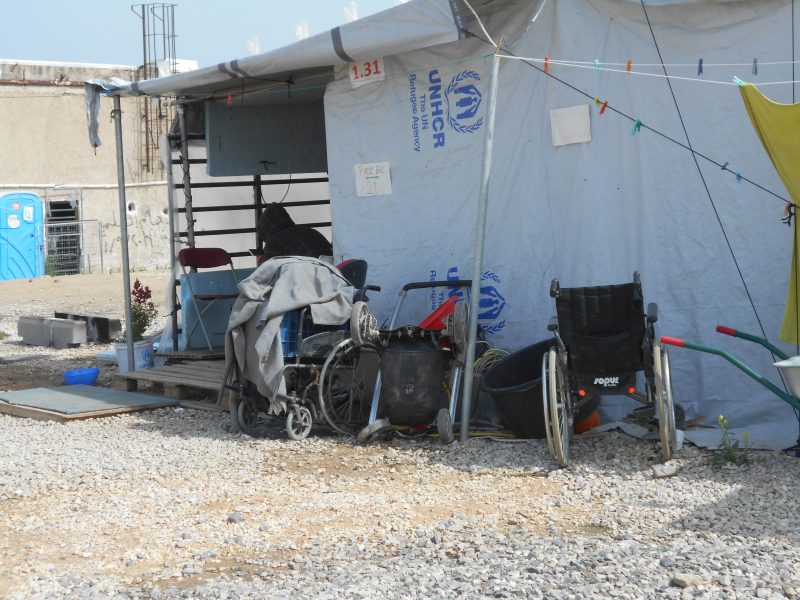
On another day we found ourselves at the Four Seasons hotel near Thessaloniki airport. Here I encountered a group of people that I’d met on a previous trip but at a different hotel many miles away. Each day presents its own challenges. On this occasion it was trying to fit two dental chairs with accompanying equipment, two dentists and assistants, patients, translators and, as seems inevitable, interested onlookers, into a small hotel bedroom.
We were in Greece on May 1, which is kept as a public holiday there as well. The evening before we’d received the instruction to go to Softex camp. It’s a place we’d been to before, I knew that it had a bad reputation but I’d not had direct experience of this myself though the setting – a disused toilet paper factory on an industrial estate – is not a prepossessing place in which to be housed. On the way, we took a wrong turning and found ourselves driving along a very narrow road with empty factories or warehouses on one side and waste land on the other.
As we rounded a corner we saw a pack of about 10 wild, stray dogs lying by the side of the road, they looked interested as we approached and then took their interest further by surrounding the car, jumping frenziedly at it and barking, leading to a hasty winding up of the windows. I’d slowed down to avoid hitting any of the dogs, the frantic jumping and barking showed no sign of stopping, so I began to drive off, gradually speeding up with the pack of dogs chasing after us until we finally got away!
Softex has two main groups of residents – Syrians and Algerians and the two don’t mix well, apparently. Just a couple of days before our visit, there had been some sort of riot caused by a Syrian woman being insulted by an Algerian and the atmosphere was tense. One of my patients was a rather feisty and fiery Algerian lady, we discovered that a Syrian lady who came in later bearing the marks on her face of an assault had received these from the pugnacious Algerian during the course of the riot. Another patient was a very young looking Syrian woman, it transpired that she was 21 but had surprisingly old children, the result of having been married at 13, which is not an unusual occurrence in parts of rural Syria.
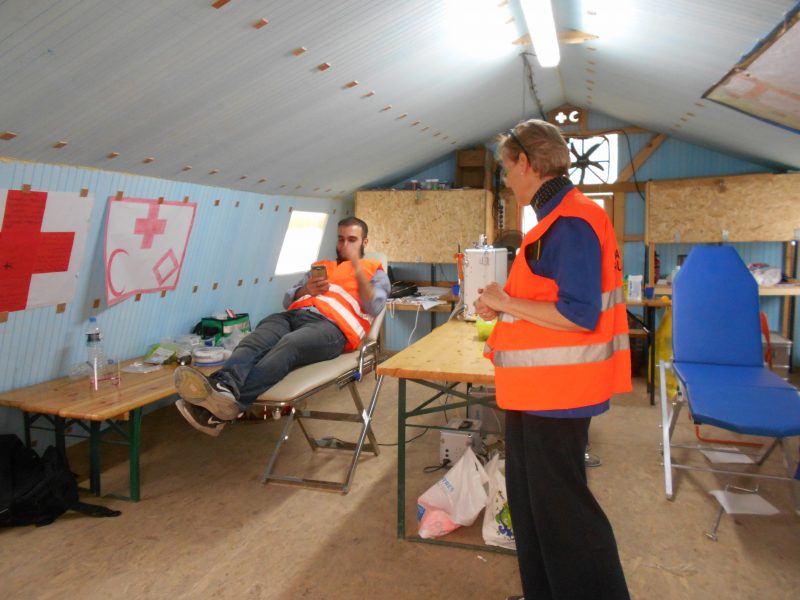
At 4:30 p.m. Hassan, our coordinator and translator, came in and instructed us to pack up immediately with all haste, telling us that we had to leave at once. We had been locked into the medical compound, the guards had got wind of another riot expected to begin imminently. So we did as instructed and ended our day at Softex being escorted to the entrance gates by guards. Thus concluded a rather strange working day, fortunately not a typical one.
A more tranquil working day was spent at Loutra Volvi, quite an idyllic setting beside a large inland lake with hot thermal springs. In more normal times, it was a small holiday resort but is now home to a group of Yazidis, people I’d seen previously – the first time being at the foot of Mount Olympus in the grounds of a derelict psychiatric hospital. These charming and hospitable people have suffered greatly at the hands of Isis/Daesh. Their homeland is the area around Mount Sinjar in Iraq, an area which they regard as sacred.
The Yazidis’ native language is Kurdish, which means a three-way translation from Kurdish to Arabic then Arabic to English, then, of course, the reply has to go back again. Some Yazidis speak Arabic and a few speak English. Most of the ones we met were hoping to go to Germany where there is already a large diaspora, though Australia was mentioned as an eventual destination; however, all would have preferred to be able to return home.
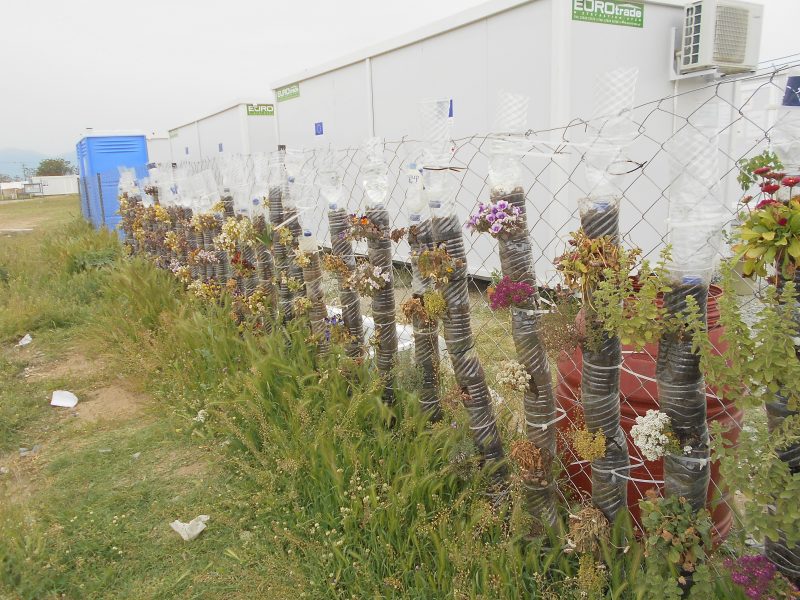
During a break when we left the hotel room in which we’d established our pop-up surgery, we had the privilege of being invited to listen to an impromptu concert on the balcony of a house. One young man was playing a bouzouki-like instrument and the other was singing a haunting, heart-rending song of longing for the beauty of their native land. This song had been written by exiles and although we could not understand the words we felt the pain and bitter-sweet sadness that were expressed by the words and music.
We worked with another dentist-plus-wife combination. Syed was an oral surgeon from Glasgow and it was useful to have a colleague nearby who was confident to do tricky extractions whereas I was more experienced in conservative dentistry (eg fillings) so we made a good team. As ever, we came away feeling privileged to have encountered interesting people and situations, as well as humbled to observe the way people cope with overwhelming events that have turned their lives upside down.
Photos: Kyriacos Hajikakou



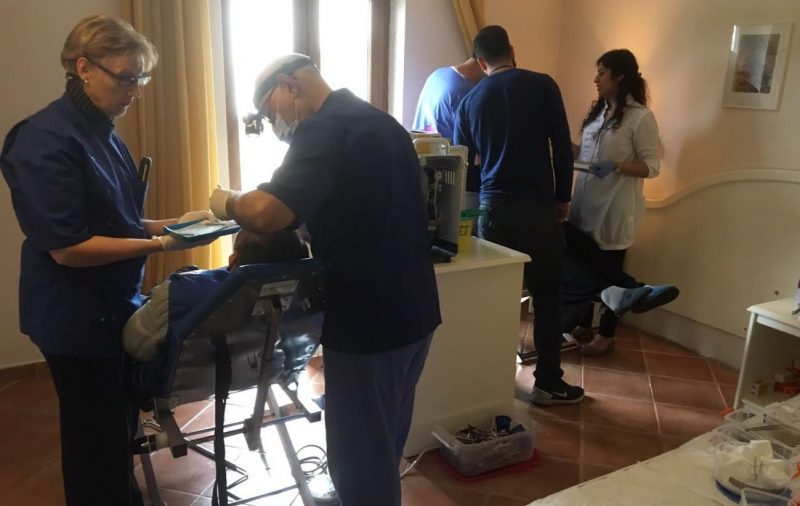
Thanks for another enlightening (and sobering) report on your latest visit as a dentist to refugees in Greece — the sometimes surprising details on who they are, how they got there, how they cope, the contribution of individuals such as you and Diana and Syed and his wife from Glasgow . . . . I am sure other readers are also asking questions about the response of our Government to alleviating some of the needs of fellow humans having to cope with ‘overwhelming events that have turned their lives upside down’. I hope your article is being shared elsewhere as it deserves to be.